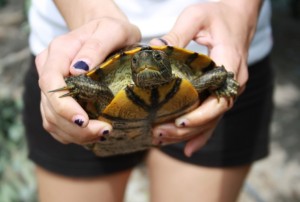Professors from the University CEU Cardenal Herrera studied 200 specimens of freshwater turtles from eleven Valencian wetland areas, to determine the prevalence of Salmonella and Campylobacter in these animals, because of their potential risk of transmitting gastrointestinal diseases to humans, especially children.
According to the results, published in the journal Plos One, 11% of the analyzed specimens of freshwater turtles were found positive for Salmonella. However, Campylobacter was not  detected in any of them. This is the first study to rule out terrapins as transmitters of campylobacteriosis to humans.
detected in any of them. This is the first study to rule out terrapins as transmitters of campylobacteriosis to humans.
The research group has used specimens of the native Emys orbicularis and of the exotic species Trachemys scripta elegans, found in eleven wetlands of the Valencian Region (Spain), including the marshes of Pego-Oliva, Xeraco, Cabanes or Peníscola, among others. In eight of the eleven wetlands the researchers found terrapins carriers of the bacteria Salmonella with moderate prevalence but none with the Campylobacter bacteria.
As pointed out by Professor of Veterinary Clara Marín, who led the study, campylobacteriosis and salmonellosis are common infections in humans: there have been 212,064 cases of the first and 99,020 cases of the second registered in the European Union during last year. Moreover, both are the two most frequent zoonosis worldwide, and thus represent an important public health problem in many countries which are interested in designing methods of preventing transmission of these infections from animals to humans. Salmonella can cause human gastroenteritis and meningitis, especially in children and elderly.
